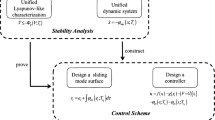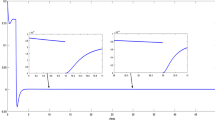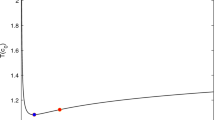Abstract
This paper investigates the issue of stabilization for discrete-time dynamical systems (DDS) by event-triggered impulsive control (ETIC). Based on some relatively simple threshold constants, three levels of event conditions are set and thus the ETIC scheme is designed. Three cases for ETIC with and without time-delays and data dropouts are studied respectively, and the criteria on exponential stability are derived for the controlled DDS. The stabilization in the form of exponential stability is achieved for DDS under the designed ETIC with or without time-delays. And in the case of the ETIC data dropouts, the conditions of exponential stabilization are derived for DDS and the maximal allowable dropout rates for ETIC are estimated. Finally, one example with numerical simulations is worked out for illustration.
Similar content being viewed by others
References
Bensoussan A and Tapiero C S, Impulsive control in management: Prospects and applications, J. Opt. Theor. & Appl., 1982, 37: 419–442.
Newman C E and Costanza V, Deterministic impulse control in native forest ecosystems management, J. Opt. Theor. & Appl., 1990, 66: 173–196.
Masutani Y, Matsushita M, and Miyazaki F, Flyaround maneuvers on a satellite orbit by impulsive thrust control, Proceedings of the 2001 IEEE International Conference on Robotics & Automation, Seoul, Korea, May, 2001, 421–426.
Yang T, Impulsive Control Theory, Springer-Verlag, 2001.
Basin M V and Pinsky M A, Stability impulse control of faulted nonlinear systems, IEEE Trans. Autom. Control, 1998, 43(11): 1604–1608.
Guan Z H, Hill D J, and Shen X, On hybrid impulsive and switching systems and application to nonlinear control, IEEE Trans. Autom. Control, 2005, 50(7): 1058–1062.
Haddad W M, Chellaboina V S, and Nersesov S G, Impulsive and Hybrid Dynamical Systems, Stability, Dissipativity, and Control, Princeton, NJ: Princeton University Press, 2006.
Goebel R, Sanfelice R G, and Teel A R, Hybrid Dynamical Systems: Modeling, Stability, and Robustness, Princeton University Press, New Jersey, USA, 2012.
Liu B and Hill D J, Stability via hybrid-event-time Lyapunov function and impulsive stabilization for discrete-time delayed switched systems, SIAM J. Control Optim., 2014, 52(2): 1338–1365.
Li X and Song S, Impulsive control for existence, uniqueness and global stability of periodic solutions of recurrent neural networks with discrete and continuously distributed delays, IEEE Transactions on Neural Networks, 2013, 24: 868–877.
Li X and Rakkiyappan R, Impulsive controller design for exponential synchronization of chaotic neural networks with mixed delays, Communications in Nonlinear Science and Numerical Simulation, 2013, 18: 1515–1523.
Tabuada P, Event-triggered real-time scheduling of stabilizing control tasks, IEEE Trans. Automatic Control, 2007, 52(9): 1680–1685.
Donkers M C F and Heemels W P M H, Output-based eventtriggered control with guaranteed L1-gain and improved and decentralised event-triggering, IEEE Trans. Automatic Control, 2012, 57(6): 1362–1376.
Mazo Jr M and Cao M, Decentralized event-triggered control with asynchronous updates, IEEE Conf. Decision and Control, Orlando, USA, 2011, 2547–2552.
Dimarogonas D V, Frazzoli E, and Johansson K H, Distributed event-triggered control for multiagent systems, IEEE Trans. Automatic Control, 2012, 57(5): 1291–1297.
Wang X F and Lemmon M D, Event-triggering in distributed networked control systems, IEEE Trans. Automatic Control, 2011, 56(3): 586–601.
Persis C D, Sailer R, and Wirth F, On a small-gain approach to distributed event-triggered control, IFAC World Congress, Milan, Italy, Aug., 2011, 2401–2406.
Liu T, Hill D J, and Liu B, Synchronization of dynamical networks with distributed event-based communication, Proceedings of the 51th IEEE Conf. Decision Control, Maui, Hawaii, USA, 2012, 7199–7204.
Yue D, Tian E, and Han Q L, A delay system method for designing event-triggered controllers of networked control systems, IEEE Trans. Automatic Control, 2013, 58(2): 475–481.
Eqtami A, Dimarogonas D V, and Kyriakopoulos K J, Event-triggered control for discrete-time systems, American Control Conference (ACC), 2010, 4719–4724.
Lehmann D, Henriksson E, and Johansson K H, Event-triggered model predictive control of discrete-time linear systems subject to disturbances, 2013 European Control Conference (ECC), July 17–19, Zurich, Switzerland, 2013, 1156–1161.
Wu W, Reimann S, Gorges D, et al., Event-triggered control for discrete-time linear systems subject to bounded disturbance, Int. J. Robust. Nonlinear Control, 2016, 26: 1902–1918.
Golabi A, Meskin N, Toth R, et al., Event-triggered control for discrete-time linear parametervarying systems, American Control Conference, 2016, 3680–3685.
Hamda K, Hayashi N, and Takai S, Event-triggered and self-triggered control for discrete-time average consensus problems, SICE Journal of Control, Measurement, and System Integration, 2014, 7(5): 297–303.
Brunner F D, Heemels W P M H, and Allgower F, Dynamic thresholds in robust event-triggered control for discrete-time linear systems, 2016 European Control Conference (ECC), June 29–July 1, Aalborg, Denmark, 2016, 983–988.
Jiang Z P and Liu T F, A survey of recent results in quantized and event-based nonlinear control, International Journal of Automation and Computing, 2015, 12(5): 455–466.
Liu T F and Jiang Z P, A small-gain approach to robust event-triggered control of nonlinear systems, IEEE Trans. Automatic Control, 2015, 60(8): 2072–2085.
Xu Q, Zhang Y, He W, et al., Event-triggered networked H8 control of discrete-time nonlinear singular systems, Applied Mathematics and Computation, 2017, 298(1): 368–382.
Lakshmikantham V, Bainov D D, and Simeonov P S, Theory of Impulse Differential Equations, World Scientific, Singapore, 1989.
Chen W H and Zheng W X, Exponential stability of nonlinear time-delay systems with delayed impulse effects, Automatica, 2011, 47: 1075–1183.
Liu J, Liu X Z, and Xie W C, Input-to-state stability of impulsive and switching hybrid systems with time-delay, Automatica, 2011, 47: 899–908.
Dashkovskiy S, KosmykovM, Mironchenko A, et al., Stability of interconnected impulsive systems with and without time delays, using Lyapunov methods, Nonlinear Analysis: Hybrid Systems, 2012, 6(3): 899–915.
Dashkovskiy S and Mironchenko A, Input-to-state stability of nonlinear impulsive systems, SIAM J. Control Optim., 2013, 51(3): 1962–1987.
Liu B and Hill D J, Comparison principle and stability of discrete impulsive hybrid systems, IEEE Trans on Circuits Syst.-I. Regular Papers, 2009, 56(1): 233–245.
Xu S, Chen T, and Lam L, Robust H8 filtering for a class of nonlinear discrete-time Markovian jump systems, Journal of Optimization Theory and Applications, 2004, 122: 651–668.
Liu B and Marquez H J, Razumikhin-type stability theorems for discrete delay systems, Automatica, 2007, 43: 1219–1225.
Author information
Authors and Affiliations
Corresponding author
Additional information
This research was supported by the National Natural Science Foundation of China under Grant No. 61673165, the Hong Kong Research Grants Council of GRF Project under Grant No. 17200415, and the Hunan Provincial Natural Science Foundation of China under Grants Nos. 2015JJ2045 and 2017JJ2070.
This paper was recommended for publication by Editor SUN Jian.
Rights and permissions
About this article
Cite this article
Liu, B., Hill, D.J., Zhang, C. et al. Stabilization of Discrete-Time Dynamical Systems Under Event-Triggered Impulsive Control with and Without Time-Delays. J Syst Sci Complex 31, 130–146 (2018). https://doi.org/10.1007/s11424-018-7135-7
Received:
Revised:
Published:
Issue Date:
DOI: https://doi.org/10.1007/s11424-018-7135-7




